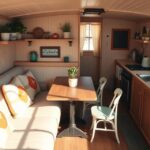Table of Contents
Welcome to your comprehensive guide on houseboat utility management. Living on a houseboat brings unique challenges.
This is especially true for managing utilities like water, electricity, and waste. In this guide, I’ll share practical solutions for these challenges. This way, you can enjoy sustainable, efficient living and houseboat maintenance.
We’ll cover water conservation techniques and how to choose the best marine electric systems. My goal is to give you the knowledge to improve your houseboat setup.
Whether you’re new or looking to improve, this guide has all you need for managing utilities on a houseboat.

Key Takeaways
- Understand the unique challenges of houseboat utility management.
- Learn effective water conservation techniques.
- Discover the best practices for maintaining your plumbing system.
- Explore efficient electricity usage and marine electric systems.
- Adopt sustainable waste management methods.
- Embrace off-grid solutions like solar power and wind generators.
Introduction to Houseboat Utilities Management
Living on a houseboat brings unique challenges and opportunities in managing utilities. Unlike regular homes, houseboats need a special approach. This ensures all needs are met while protecting the water. Knowing how to manage utilities is key for a sustainable life on water.
Managing water on a houseboat is crucial. Since houseboats don’t have endless water like homes on land, they must use water wisely. Adopting sustainable practices helps reduce environmental impact and keeps a steady water supply.
Managing electricity is just as important. Houseboats use a mix of batteries, solar panels, and generators. Knowing how to use and maintain these sources ensures a steady power supply.
Waste management is different on a houseboat. It’s crucial to dispose of waste properly to keep the water clean. Using eco-friendly methods helps protect the water ecosystem.
In summary, mastering houseboat utilities management is key to a good life on water. From saving water to using renewable energy and eco-friendly waste practices, these steps are vital. They let you enjoy a calm and greenhouseboat life.
SHORTCODE FOR NEWSLETTER:-
Managing Utilities: Water, Electricity, and Waste on a Houseboat
Living on a houseboat means dealing with water, electricity, and waste smartly. Doing this well boosts how well everything runs. Plus, it helps live a green life off the grid.
Understanding the Basics
Handling your houseboat’s utilities starts with knowing your systems. For water, you need enough clean water and a way to deal with waste water. You must also learn about your boat’s plumbing systems, like pumps.
Keeping the lights on means mixing power sources. You could use batteries, solar panels, and even wind power. This mix helps you stay powered without needing outside help. It’s what off-grid living is all about.
Importance of Proper Management
Managing your houseboat’s needs isn’t just nice—it’s your duty. Doing it right has little impact on the planet, saves resources, and follows the rules of the sea. The choices we make affect the water’s health, so we must be careful.
Being thoughtful with how we use water, make electricity, and get rid of waste leads to a better life off-grid. Eco-friendly actions and ongoing upkeep make living on a boat better. They also help protect the beautiful nature around us.
Water Conservation on Houseboats
Water conservation on houseboats is vital for living sustainably on the water. With simple strategies, people can cut their water use and still live comfortably. Let’s look at some easy and smart ways to manage water on a houseboat.
Efficient Water Usage Tips
To use water wisely on houseboats, start with mindful habits and install water-saving devices. Here are essential tips:
- Install low-flow showerheads and faucets to cut down on water waste.
- Regularly check for leaks in your houseboat’s water systems and fix them.
- Turn off the tap while brushing your teeth to save water.
- Wash dishes in a basin instead of running the tap non-stop.
Collecting and Storing Water
Gathering and storing water also boosts your independence. Consider these options:
- Put in a rainwater harvesting system to collect roof rainwater.
- Store collected rainwater in tanks for different uses.
- Keep your water storage tanks clean to ensure the water stays fresh.
Following these tips boosts water conservation on houseboats, promoting sustainable living. Good water management not only saves resources but makes houseboat living eco-friendly and comfy.
Houseboat Plumbing Solutions
On a houseboat, managing water and waste is key. You need to understand the plumbing systems well. Picking the right system and keeping it in good shape is crucial. This way, you’ll have a smooth experience with water and electricity on your boat.
Choosing the Right Plumbing System
Choosing a plumbing system for your houseboat is about knowing what you have room for. You also need to think about the challenges of living on the water. Systems that don’t take up much space like marine toilets and tankless water heaters work best.
- Marine Toilets: These are great for saving space. Brands like Dometic and Jabsco are well-liked.
- Tankless Water Heaters: They give you hot water when you need it and don’t take up a lot of room. Bosch and EcoSmart are reliable brands to consider.
- Greywater Tanks: These collect water from your sinks and showers. They make sure you can deal with wastewater the right way.
Maintaining Your Plumbing System
To make sure your plumbing works well, regular checks are essential. Looking over your system often helps find problems early. This keeps your boat’s utilities running smoothly.
- Periodic Checks: Always checking hoses, seals, and connectors stops leaks. Replace anything that’s worn out quickly.
- Clean and Flush Tanks: Keeping freshwater and greywater tanks clean prevents blockages.
- Monitor Water Pressure: Make sure the water pressure is just right to protect your plumbing.
- Use Marine-safe Products: Choose cleaning supplies that won’t harm the water around you. This helps both your boat and the environment.
Following these tips will help you keep your boat’s water and electricity running well. It makes living on a houseboat both comfy and eco-friendly.
Electricity Usage on a Houseboat
Managing electricity on a houseboat is key to living well on the water. It means knowing how much energy you need, watching how much you use, and being smart about it. This helps make sure you have enough power without wasting it.
Houseboats often use solar panels, batteries, and sometimes generators for power. Solar panels are great for cutting down on electricity needs. It’s also important to have good batteries to store the power you make.
It’s crucial to keep an eye on your electricity use. Energy monitors let you see your usage in real time. This tells you when you’re using a lot of power, so you can cut back if needed.
Want to know how much electricity your appliances use? Here’s a chart showing the average usage for common houseboat appliances:
| Appliance | Average Wattage | Average Daily Usage (hours) | Daily Consumption (kWh) |
|---|---|---|---|
| Refrigerator | 150W | 24 | 3.6 kWh |
| Lighting (LED) | 10W | 5 | 0.05 kWh |
| Microwave | 1000W | 0.5 | 0.5 kWh |
| Fans | 75W | 10 | 0.75 kWh |
| Water Heater | 1500W | 1 | 1.5 kWh |
Using less electricity on your houseboat is about making smart choices. Choose energy-saving appliances and turn things off when you’re not using them. Reducing use of appliances that eat up a lot of power helps too. These steps can lead to better energy use and a nicer life on the water.
Marine Electric Systems
Switching to marine electric systems boosts your houseboat’s efficiency and sustainability. Using renewable energy like solar power lets you live off-grid. This cuts down on using traditional energy sources.

Installing Solar Panels
Solar panels are key for marine electric systems. They use the sun’s energy, making solar power houseboats a renewable choice. Finding the best spot for the panels is key for getting the most sunlight. Choosing high-quality panels also increases efficiency and lifespan.
Battery Storage Solutions
For marine electric systems, having enough battery storage is critical. This storage makes sure solar power is available anytime, even when it’s cloudy or at night. This is important for houseboat living off the grid, as it gives a steady energy source. You can pick from different batteries, like lithium-ion or lead-acid, depending on your needs and budget.
| Battery Type | Capacity | Cost | Life Span | Maintenance |
|---|---|---|---|---|
| Lithium-Ion | High | Expensive | 10-15 years | Low |
| Lead-Acid | Moderate | Affordable | 5-8 years | Moderate |
Energy Efficient Appliances for Houseboats
Selecting the right energy efficient appliances for houseboats is essential. These appliances help manage power use and support a green lifestyle. On houseboats, where energy use needs careful monitoring, choosing products that save energy while still being functional is critical.
Choosing the Right Appliances
Picking appliances for your houseboat involves balancing energy efficiency with performance. Seek out ENERGY STAR rated items like fridges, microwaves, and air conditioners. These products use less energy without losing functionality. Also, small and versatile appliances save both space and energy.
Energy Consumption Tips
For a green houseboat lifestyle, managing how much energy your appliances use is key. Here are some strategies to cut down energy use:
- Unplug Appliances: Unplug them when not in use to stop electricity waste.
- Use Energy-Saving Modes: Use energy-saving settings to cut down on power use.
- Regular Maintenance: Keep appliances in top shape for maximum efficiency.
- Opt for LEDs: Switch to LED bulbs for more energy savings.
By adopting these tips, you can greatly reduce your houseboat’s energy use. This not only makes your home on the water more eco-friendly but also saves money over time.
Sustainable Waste Management on Houseboats
Living on a houseboat is special. But using eco-friendly ways to manage waste makes it better. It’s not just about getting rid of trash. It’s about reducing waste, recycling, and dealing with biodegradable materials responsibly.
To cut down on waste, think about what you’re buying. Choose reusable items instead of throwaway plastics. Pick products with little packaging that can be recycled. Being mindful about these things helps make houseboat living more eco-friendly.
Sorting waste on houseboats is crucial. Separate recyclables, compostables, and non-recyclables properly. This way, each kind of waste can be handled right. Let’s see how to manage different wastes:
| Type of Waste | Method of Disposal |
|---|---|
| Organic Waste | Composting on board or taking it to shore-based composting facilities. |
| Recyclables | Segregating and transporting to designated recycling centers on shore. |
| Non-recyclable Waste | Properly bagging and disposing of in appropriate shore-based bins. |
Composting on your houseboat is great for the environment. It turns food scraps and other organic materials into nutrient-packed compost. This compost is perfect for gardening on land.
By following these practices, I make a positive impact. My actions, from waste reduction to recycling, help keep our waterways clean. This is how I support sustainable living on houseboats.
Houseboat Off-grid Solutions
Living off-grid on a houseboat is becoming crucial. It reduces the need for shore power. Off-grid solutions boost your independence and support a greener way of living.
Solar Power Systems
Solar power systems are key for houseboats to go off-grid. By putting solar panels on your houseboat’s roof, you capture sun energy. This lessens the need for traditional energy sources.

- They provide a renewable and clean energy source.
- Maintenance costs are relatively low once installed.
- They operate silently, ensuring a peaceful environment.
Wind Generators
Using wind energy is another smart off-grid choice for houseboats. Wind generators work great with solar power, especially in windy areas.
Wind energy has many advantages for houseboats:
- Provides a consistent energy source, particularly during windy seasons.
- Functions well regardless of daylight hours, allowing for 24/7 energy production.
- Combines synergistically with solar power systems for continuous power availability.
| Solution | Advantages |
|---|---|
| Solar Power Systems | Renewable, low maintenance, silent |
| Wind Generators | Consistent energy, 24/7 operation, synergetic effect with solar |
These off-grid solutions make houseboat living more independent and sustainable. They help you live a self-reliant life on the water.
Eco-friendly Practices for Houseboat Living
Living sustainably on a houseboat means adopting eco-friendly habits. These practices make both the environment and your houseboat experience better. They help your houseboat last longer and run more efficiently.
Reducing Waste
It’s vital to cut down waste when living on a houseboat. Here’s how you can do it:
- Composting organic waste: Turn kitchen scraps into nutrient-rich soil with composting systems.
- Recycling: Sort out recyclables like plastics, metals, and paper. Then, take them to recycling centers.
- Minimal packaging: Choose items with little or biodegradable packaging to lessen landfill waste.
Using Eco-friendly Products
Using green products is crucial for houseboat living. Consider these options:
- Biodegradable cleaning supplies: Choose cleaners that naturally decompose. They won’t hurt water life.
- Eco-friendly toiletries: Pick shampoos, soaps, and other items made from natural materials.
- Sustainable wear and gear: Opt for clothes and gear from recyclable or sustainable resources.
By following these green practices, you greatly lower your environmental footprint. This makes living on a houseboat more sustainable and enjoyable.
Preventative Maintenance for Houseboat Utilities
Keeping your houseboat’s systems at their best means following a strict preventative maintenance for houseboat utilities plan. You need to do regular checks to spot problems early. This stops big repairs or harm to the environment later. Learn the steps for houseboat utilities maintenance, from simple looks to deeper technical checks.
Maintain all your houseboat’s utilities to ensure they last long and work well. Do this with regular care. Below, find a simple guide to keep your boat’s utilities great:
- Inspect water lines and tanks: Check your plumbing often for leaks or damage to avoid water loss and harm.
- Electrical system checks: Make sure all electrical parts are connected right and batteries work well to stop power issues.
- HVAC maintenance: Clean your air system’s filters and look for any blocks to keep it running smoothly.
- Regular waste system reviews: Always check your waste systems to keep them clear and working right.
We can organize the houseboat utilities maintenance jobs and how often to do them in the table below:
| Maintenance Task | Suggested Frequency |
|---|---|
| Water System Inspection | Monthly |
| Electrical System Check | Quarterly |
| HVAC System Maintenance | Bi-Annually |
| Waste System Review | Weekly |
By following these steps, you make sure your houseboat’s main systems stay working well. This makes living on the water reliable and fun.
Conclusion
We’ve covered a lot in this guide. We looked at saving water and fixing plumbing on houseboats. We also talked about using electricity wisely and dealing with waste in a green way. These steps are key for a good life on a houseboat that doesn’t harm the planet. By following these tips, you help make living on houseboats better for the environment.
Making your houseboat utilities better isn’t just to save money. It’s to live well and gently on Earth. Using things like solar panels and energy-saving appliances helps a lot. These green choices show you care about our world.
I hope you now know more about managing your houseboat’s utilities in a smart and green way. Using what you’ve learned can make life on the water better and more fun. It shows that living on a houseboat can be amazing and still be kind to Earth.
FAQ
What are the key factors to consider in houseboat utility management?
When managing a houseboat, it’s key to think about saving water, using less electricity, and handling waste well. We must use energy-saving devices, set up the right plumbing, and choose earth-friendly ways to manage trash. All to match the special lifestyle of living on the water.
How can I conserve water on my houseboat?
To save water on a houseboat, install devices that use less water and fix any leaks right away. Also, collecting rainwater can help keep your water supply going and is better for the environment.
Why is electricity management important on a houseboat?
Managing electricity right keeps your power needs met and cuts down on harm to the environment. Keep an eye on how much you use, go for appliances that don’t use a lot of energy, and try using solar panels. This helps you rely less on shore power and live more sustainably.
What plumbing solutions are best for houseboats?
The best plumbing for a houseboat must fit in small spaces, last a long time, and be easy to look after. Make sure you check it often and fix any problems early to keep everything running smoothly and avoid big issues.
How can I implement renewable energy systems on my houseboat?
For renewable energy on a houseboat, setting up solar panels and using battery storage works well. This gives you a dependable, green way to power your home, making you less dependent on others for electricity.
What are some tips for selecting energy-efficient appliances for a houseboat?
Pick appliances for your houseboat that don’t use much energy and fit the boat’s power limits. Look for ones marked with Energy Star and think about what you really need to lower how much energy you use.
How can I manage waste sustainably on my houseboat?
To handle waste on a houseboat in an earth-friendly way, try to make less trash, get rid of it responsibly, and compost food waste. Recycling and using less plastic helps keep the water around you clean and healthy.
What are the benefits of using off-grid power solutions like solar panels and wind generators for houseboats?
Using solar panels and wind generators means you need less power from the dock. These green sources give you a steady power supply. They make your houseboat life more eco-friendly and self-sufficient.
What eco-friendly practices can I adopt for houseboat living?
To live green on a houseboat, reduce trash, pick earth-friendly products, and use energy wisely. These steps lessen your impact on nature and help protect our waterways.
Why is preventative maintenance important for houseboat utilities?
Keeping up with maintenance helps your houseboat’s systems last longer and work better. Checking things regularly, fixing problems promptly, and watching for wear and tear saves money. It keeps everything running well and supports a lasting, green home on the water.



